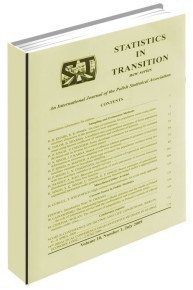Estimating Population Mean with Missing Data in Unequal Probability Sampling
Estimating Population Mean with Missing Data in Unequal Probability Sampling
Author(s): Kajal DihidarSubject(s): Economy
Published by: Główny Urząd Statystyczny
Keywords: non-response;missing at random;missing completely at random;unequal probability sampling
Summary/Abstract: Nonresponse problem is a serious obstacle to the validity of estimates in a survey. The estimates become biased due to the missing values in data. The problem is how to deal with missing values, once they have been deemed impossible to recover. One way of exploring a possible lack of representativity in missing data is to estimate the response probabilities which are usually done by logistic regression model. However, the drawback of the logit model is that this requires values of the explanatory variables of the model to be known for all nonrespondents. Bethlehem (2012) showed that the response probabilities can be estimated by some weighting adjustment technique without having the individual data of the nonrespondents. Here we consider the doubtful nature of nonresponse regarding possible existence of relationship with any of the covariates. Moreover, instead of simple random sampling, we consider general unequal probability sampling scheme for selecting respondents. This paper presents the modification of Bethlehem (2012) proposal for unequal probability sampling to obtain the unbiased estimators for population total/average of a variable of interest and variance estimator and compares them with the usual estimators through numerical simulations.
Journal: Statistics in Transition. New Series
- Issue Year: 15/2014
- Issue No: 3
- Page Range: 369-388
- Page Count: 20
- Language: English

